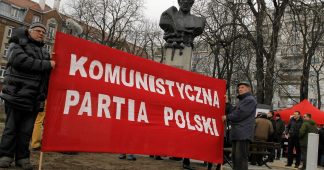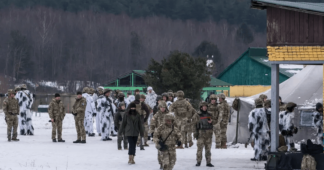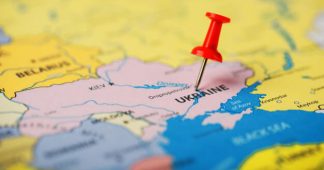Poland jails Spanish-Russian journalist Pablo González on bogus spy charges
By Alice Summers
Mar 25, 2022
Spanish journalist Pablo González has been arrested and imprisoned by the Polish government on charges of spying for Russia.
González, who was born in Moscow and has both Russian and Spanish citizenship, had been reporting on the refugee crisis at the Polish-Ukrainian border. On February 28, after the Russian invasion of Ukraine, he was seized by the Polish security services. If found guilty of espionage, he could face up to 10 years in prison.
Polish authorities claim González was working for Russia under cover of his status as a journalist. “As a result,” the Polish government stated in a communiqué, “he could move freely around Europe and the world, including zones affected by armed conflict and areas of political tension.”
Among the Polish state’s vague allegations are that González obtained information during his journalistic work “whose use on the part of the Russian secret services could have a direct negative impact on the security and internal and external defence of our country [emphasis added].” Not a single piece of evidence has been presented that González actually handed any information to the Russian secret services, however, or even that he ever had any intention to do so.
Polish authorities also alleged that González was in possession of two passports bearing different names, one Russian and one Spanish, implying that one was a false identity used for espionage. González’s Russian passport names him as Pavel Rubtsov, using his father’s surname; his Spanish document identifies him as Pablo González Yagüe, using his mother’s two surnames and with Pablo being the Hispanicised version of the Russian name Pavel.
González should be immediately released. The arrest of a journalist on baseless spying charges is an anti-democratic attack on freedom of information and freedom of speech. It comes amid an international campaign against Russian artists and performers, targeting any individual or institution with even the flimsiest of links to the Russian state.
At the end of February, the Mérida Festival announced that it will no longer open its programme with a performance of Spartacus by the St. Petersburg Ballet, though most of the performers in this ballet company aren’t even Russian, according to the company’s director Tatiana Solovieva. A scheduled March 5 performance by Russian pianist Denis Matsuev at the Palau de la Música Catalana, in Barcelona, was also cancelled at short notice.
The Pushkin Institute in Madrid suspended its entire cultural programme, organised to celebrate its fifth anniversary and due to begin on March 7. And in early March, Madrid announced that its Ministries of Science and Innovation and of Universities will cut all ties with Russian and Belarussian research organisations.
The persecution of González has been a coordinated effort by the ruling elites in Poland, Ukraine and Spain itself. In early February, the journalist was detained in Kiev, after receiving a phone call from the Ukrainian security services summoning him to the capital for questioning.
González complied with the order, travelling to Kiev from the eastern Ukrainian Donbas region, where he and two fellow journalists had been covering the conflict between pro-Russian separatists and the Ukrainian government. In Kiev, González was questioned by Ukrainian security services for allegedly being “pro-Russian.” Even leaving aside the fact that being “pro-Russian” does not constitute criminal activity, the “evidence” presented by the Ukrainian security services for the accusation was spurious.
Besides González’s dual citizenship and his fluent understanding of Russian, the Ukrainian security forces cited accusations that the reporter had a credit card issued by Basque financial institution Laboral Kutxa and that he had written for the Basque newspaper Gara.
Gara is the successor publication of the Basque nationalist newspaper Egin, shut down in 1998 by judge Baltasar Garzón on the false grounds that it had aided the Basque separatist terrorist group ETA. In 2009, the Spanish High Court overruled this verdict, stating that there was no evidence of illicit activity. Madrid has also claimed that Gara is funded by the Russian state.
The Ukrainian security services reportedly then “invited” González to leave the country in three days, although no formal expulsion order was issued. González contacted the Spanish Embassy in Kiev to explain his case and spoke with Spain’s consul general, who advised him to leave.
González then returned to the Basque Country, in Spain, where he is based. Then on February 25, the day after Russia invaded Ukraine, González travelled to the Polish town of Rzeszow, on the border with Ukraine, to report on the refugee crisis. At the time, González had told Público, a Spanish news site to which he has contributed as a freelance journalist, that “I have to return to Poland to earn my bread.”
Shortly after González’s interrogation by the Ukrainian security forces, the Spanish National Intelligence Centre (CNI) visited the homes of his family members in the Basque Country and Catalonia, reportedly questioning them about González’s life and views to establish if he was “pro-Russian.” According to Público, the security agents also told González’s relatives that he was accused of having worked for Gara, described as “a pro-ETA media subsidised by Russia,” and even of “passing information on to Russia.”
In a blatant attempt at intimidation, numerous agents went to Pablo González’s own home, where he lives with his wife Oihana Goiriena, and their three children. According to Goiriena, “Eight people came, in two vans. As far as I know, they didn’t search anything. They just asked us questions and let us know that they knew about Pablo’s career path, where he was travelling to and from, etc.”
Since his arrest, González has been held in a Polish prison without access to his lawyer, Gonzalo Boye, or any other contact with the outside world. According to Boye, who has also represented former Catalan President Carles Puigdemont, González has received no help from the Spanish consulate in Poland, leading him to appeal to the International Committee of the Red Cross (ICRC) for “protection” for his client.
This differs from the treatment received by the far-right Valencian pensioner Mariano García Calatayud, 74, allegedly detained by the Russian army in the Ukrainian city of Kherson. According to the daily ABC, García enlisted with the militias controlling the city. The Spanish Ministry of Foreign Affairs immediately launched an investigation, and the Spanish embassy in Kiev is in close contact with the family. García has been photographed with far-right Right Sector flags.
Numerous international press associations, including the International Press Institute, the Platform for Freedom of Information and the International Federation of Journalists have called for the release of González, denouncing his arrest as an attack on freedom of the press. On Twitter, Reporters Without Borders also “demand[ed] the immediate release of Pablo González and ask[ed] for explanations from the Polish authorities about the circumstances of this abuse of the freedom to report in the case of @PabVis [González].”
Meanwhile, three congressional deputies of the “left populist” Podemos party, the junior partner of the Socialist Party (PSOE)-Podemos administration, have appealed to their own government to demand their “involvement to free [González] as soon as possible.”
No faith can be put in Podemos or the PSOE to secure González’s release. In fact, Podemos is deeply implicated in these anti-democratic attacks on workers and intellectuals in Spain. Podemos Vice-Prime Minister Yolanda Díaz sits on the governing body of the CNI—the very organisation sent to intimidate and question González’s family members.
The struggle for the release of González can only be waged by workers and youth across Europe and internationally, as part of a movement against the NATO war drive in Eastern Europe and the participation of the PSOE-Podemos government in it.
Published at www.wsws.org
We remind our readers that publication of articles on our site does not mean that we agree with what is written. Our policy is to publish anything which we consider of interest, so as to assist our readers in forming their opinions. Sometimes we even publish articles with which we totally disagree, since we believe it is important for our readers to be informed on as wide a spectrum of views as possible.












